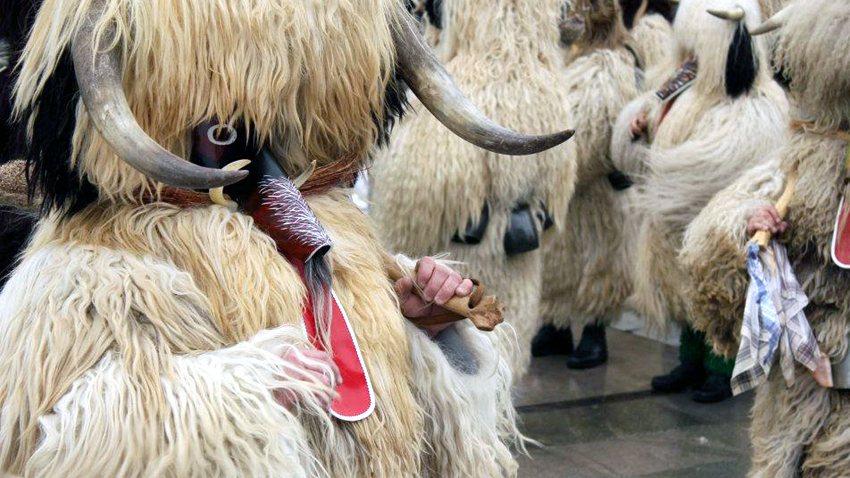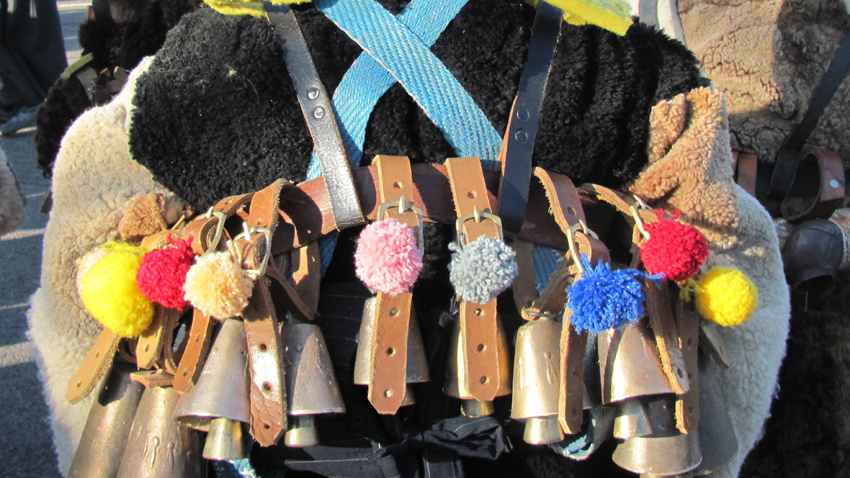 3
3
For most Bulgarians the name Surva is linked to the first day of the New Year when children decorate cornel tree twigs with multicolored woolen threads, dried fruit and popcorn and then go to friends and relatives to tap their backs with the twigs for the sake of sound health. They wish them a plentiful and healthy year chanting traditional rhymes.

Presumably, the name of the festival derives from the adjective surov (raw) - since the twig should be raw, freshly cut off from the cornel tree, tough, with buds, and full of life's energy. The New Year should be exactly like this- freshly cut off from the Tree of Life. Similarly, the man tapped on the back on its first day should be healthy, joyful, strong and lucky.
According to other hypotheses the name of Surva festival is derived from the ancient adjective sur that means grayish in color but also bright, shining, golden or sunny. Some scholars guess there was a Slavic god of the sun, Sur, venerated during this part of the year. Some refer even to the Sanskrit word suria meaning sun. It is curious that in Bulgarian folklore the epithet sur refers to various mythological creatures such as the deer, the dragon, the bear, the bird and the ox.
In the region of Pernik, west of Sofia, Surva celebrations do not end on 1 January. Thirteen days later the people in the region welcome the New Year according to the old, Julian calendar. This is the time for the local masquerade games known with the names Surva, Surova and Sirova. By tradition young, single men get masked and for them the ritual is in fact an act of initiation: once they have joined Surva they are free to get married. In our day though older men join the festival, as well as children and young girls. Outfits and masks are diverse made of animal fir and horns, colorful fabrics and bird feathers. Sheep bells are mandatory tied to the waists of dancing figures. Together with the mask and outfits bells are the pride of the Surva man, and could weigh up to 50 kg. Their rhythmic and loud peal echoes across villages announcing the arrival of Surva men (survakari). This year the festival was held on 13 and 14 January.

The companies of young men are led by bilyukbashii (chieftains) dressed as military men and armed with swords and whistles that determine the rhythm of pageants. Among them there are some funny characters - an Orthodox priest, a bride and bridegroom, a Gypsy woman and a bear-trainer with a bear. On the eve of the festival Surva the group of men gathers with lighted torches in the center of the village where its members make a big fire and dance around it. On the next day they go round the houses accompanied by musicians and bless the community for health and fertility. This ancient folklore festival surviving to the present day has been acknowledged as a Living Human Treasure of Bulgaria and since December 2015 has been on the Representative UNESCO List of Intangible Cultural Heritage.
In the coming days, another Surva event is due - the International Festival of Masquerade Games in Pernik from 29 to 31 January. Having emerged from the local tradition, the festival has gained popularity and attracts participants from all continents of the globe. In 2016 the festival celebrates its 50th anniversary with a 25th edition. A most exotic entrant this year is a group from Mali that is going to present the traditions of the African tribe of Dogon.

English version Daniela Konstantinova
Photos: BGNES and Vihra Baeva
The audio file contains the following songs:
1. Kukere le, darti (Old, old mummer) performed by Manol Mihailov
2. Kukreski igri (Mummer games) - bagpipe with sheep bells, performed by Kostadin Varimezov
Martenitsas are one of the symbols of Bulgaria – regarded as the harbinger of spring and the end of darkness. Every year, on 1 March, Bulgarians, wherever they may be in the world, give friends and family the red-and-white tassels, as a token of..
February 22 marks the 90th anniversary of the birth of Kichka Savova - one of the most significant singers from Bulgaria's Thrace folklore region. All who knew her during her lifetime keep in their hearts the memory of a talented, truly good, bright and..
For the fourth year in a row, the town of Tran in Western Bulgaria will host a winter festival of masquerade games. The beginning will be set on February 3 from 12:00 to 14:00 in the central town square. Four survakari groups from Zemen, Trun and the..

+359 2 9336 661
